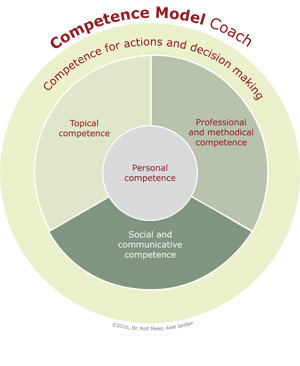Modelo de Competencia Coach
Within the “coaching” situation, the coach builds up
a context with his coachee, group or team which is made up of the
values “freedom”, “voluntariness”, “provision
of resources” and “self-control”. The coach carries
the responsibility for the coaching process. In addition, he also
takes into consideration the values of the coachee, group or team,
which are also part of the context. The coach is, therefore, in the
truest sense of the word, “appreciative”.
For this “enhanced” context he has developed the abilities and skills
and is able to be successful in this context within the framework of his process
responsibility. The same definitions are also valid for topical areas of competence.
- Personal competence
- Professional and methodical competence
- Social-communicative competence
- Topical competence
- Competence for actions and decision making
|
 |
Personal competence
Personal competence means having identified one’s own feelings, motives,
needs and values within a context and to be able to assess one’s own
behaviour.
Professional and methodical competence
Professional and methodical competence means possessing the professional know-how
and skills for a context and being able to organise work processes in a results-oriented
way within this context.
Social-communicative competence
Social-communicative competence means dealing with, in a self-controlled fashion,
feelings, motives, needs and values of one’s self and of other people
and recognising differences in order to be able to agree upon a social context
which incorporates the interests of all those involved.
Topical competence
Topical competence means having had reflected experience in a field, in a topic
or culturally within a context.
Competence for actions and decision making
Competence for actions and decision making means being able to recognise the
meaning of a context, differences to other contexts as well as being able
to coordinate all of one’s own resources into situational individual
action.
|









